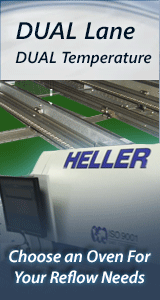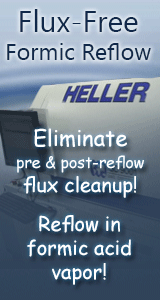IPC — Association Connecting Electronics Industries® has released the F revisions of two of the industry’s most widely used standards, IPC J-STD-001, Requirements for Soldered Electrical and Electronic Assemblies, and IPC-A-610, Acceptability of Electronic Assemblies. The documents have been updated to include technical advances in solder on plastic surface mount (SMT) components, new criteria for P-style and solder-charged Butt/I SMT terminations, a change to void criteria for BGAs, and enhancements to the language within the documents to provide ease of use and clarity. New photos facilitate further understanding.
The revision process involved dedicated volunteers from electronics companies in the Americas, Europe and Asia. With the mantra, “in data we trust,” IPC committee members focused major changes in areas such as the shrinking sizes of plastic packages that affect solder touching component bodies.
Dispelling past concerns that solder could not touch plastic components for fear of future failure, Teresa Rowe, IPC director of assembly technology, said “We [committee] didn’t find significant occurrences of failures when solder touched the plastic bodies.”
Rowe explains that there was much discussion on this topic and expects that as research in this area continues, the committee will consider it in future revisions.
The chapter on conformal coatings also underwent significant changes. “We revised the way we look at conformal coatings, providing new information on coating thickness,” Rowe said. “We also looked at bubbles, voids and transparency, expanding our criterion for acceptance.”
The standards also cover Class 2 plated-through hole vertical solder fill requirements and Class 2 flux activity criteria.
Often used as companion documents, IPC J-STD-001F and IPC-A-610F each has a unique purpose. Whereas IPC J-STD-001 is a material and process requirements document and is critical for use during manufacturing, IPC-A-610 is a post-assembly acceptance standard.
Translations of the F revisions and training programs based on the revised standards will be released in the coming months. For more information on IPC J-STD-001F, visit www.ipc.org/001; for more information on IPC-A-610F, visit www.ipc.org/610 or contact Rowe at TeresaRowe@ipc.org or +1 847-597-2838.
IPC (www.IPC.org) is a global industry association based in Bannockburn, Ill., dedicated to the competitive excellence and financial success of its 3,500 member companies which represent all facets of the electronics industry, including design, printed board manufacturing, electronics assembly and test. As a member-driven organization and leading source for industry standards, training, market research and public policy advocacy, IPC supports programs to meet the needs of an estimated $2 trillion global electronics industry. IPC maintains additional offices in Taos, N.M.; Washington, D.C.; Stockholm, Sweden; Moscow, Russia; Bangalore and New Delhi, India; Bangkok, Thailand; and Qingdao, Shanghai, Shenzhen, Chengdu, Suzhou and Beijing, China.
 »
»





